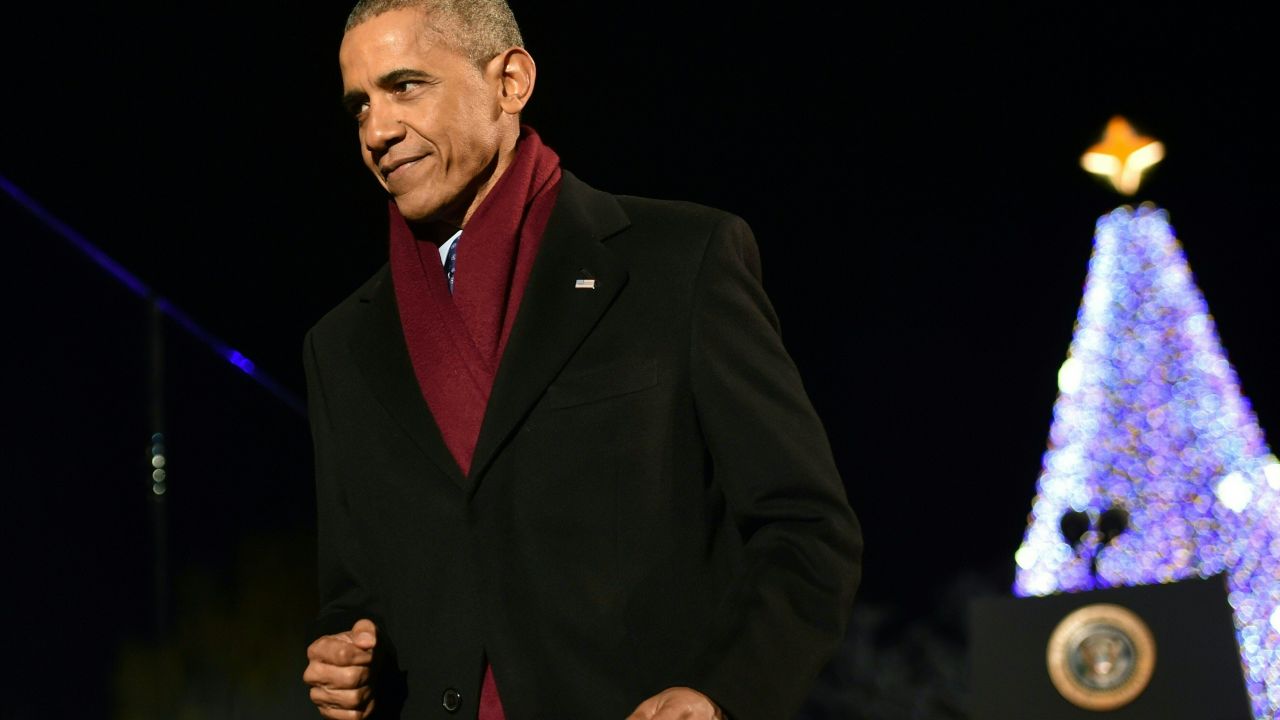
US President Barack Obama attends the National Christmas Tree Lighting on the National Mall in Washington, December 1, 2016. (NICHOLAS KAMM/AFP/Getty Images)
This post originally appeared at Talk Poverty.
I have spent the last 50-plus years of my life fighting poverty. In 1967, when I worked for Sen. Robert Kennedy as his legislative aide, the senator and I traveled to Mississippi. We saw children starving — literally — with bloated bellies, open sores that wouldn’t heal. Our nation did the right thing then — we expanded the food stamp program — and that’s why you don’t see that kind of starvation here today.
But we had to fight for it. And now we are going to have to fight again.
During his presidential campaign, Donald Trump spoke about America’s inner cities in dystopian terms, rendering a picture even more dire than the real one (which is plenty bleak). He promised that he would fix everything, without providing any specifics. But city leaders were quick to point out that he wasn’t really speaking to the residents themselves, who understand the challenges their communities face on a daily basis. Instead, he chose to play up stories about crime and violence to appeal to the worst instincts of white voters.
If President-elect Trump had a real interest in addressing concentrated urban poverty, he could build on President Obama’s record and learn about the important work that is already happening in every major city.
Instead, we will soon see an all-out attack on virtually every federal program that helps low-income people, from cradle to the grave, wherever they live. It will put millions of Americans at risk, whether it’s losing food or health care or housing. Anyone who cares needs to join in fighting back — those who are directly suffering, and those who have the privilege to remain untouched by retrogressive policy. At the same time, we can’t limit ourselves to defensive action — we need to put forth a vision for our future and work toward its realization.
Many of the policies that low-income neighborhoods need do not focus on them exclusively. A real full-employment policy would help beached boats float wherever they are, and raising the minimum wage would help low-wage workers across the country climb out of poverty.
President Obama took us forward on these matters, sometimes in big steps and sometimes small. He had many other significant efforts blocked by Congress — such as his most recent jobs proposal, an increased minimum wage and comprehensive immigration reform. His housing initiatives reflected his commitment to people having a genuine choice about whether to stay in their current community with improved economic conditions or move to opportunities elsewhere. He did not achieve radical change, but he understood that the quality of life in high-poverty places depends on a mosaic of policies — and he was heading in the right direction.
The Obama administration undertook place-based work that targeted rural, urban and tribal communities. In fact, its efforts to support neighborhood revitalization have been more impressive than any previous administration — even given the funding limitations imposed by the Republican-majority Congress that has been in place since 2010.
Obama’s creation of Promise Neighborhoods, based on the work of Geoffrey Canada and the Harlem Children’s Zone, was a significant innovation toward that end. The initiative uses schools as hubs for community partnerships, where cradle-to-career educational programs and family supports are designed to improve educational and development outcomes for children. Since 2010, a dozen Promise Neighborhoods have received sizable five-year grants for implementation and are operating on a substantial scale.
Through executive action, President Obama also created Promise Zones. These low-income neighborhoods receive preference for funding from a variety of existing federal programs. The marshaling of funds that are already appropriated means that program money is spent where it is needed most, and that’s something that should appeal to progressives and conservatives alike.
The Obama administration also reconstituted the first President Bush’s HOPE VI into a version 2.0, called Choice Neighborhoods. Had it been properly funded, it would have had more reach in helping to build stronger communities through mixed-income housing, including housing for people with the lowest incomes. This was a key effort given that rental assistance to families with children is at its lowest point since 2004, and homelessness of school-aged children is at a record high.
Support from the Obama administration — including grants from these place-based programs — have fostered the growth of a number of sophisticated, multifaceted inner-city organizations and partnerships, all doing valuable work for children and families, the elderly and people with disabilities.
The Youth Policy Institute (YPI) in Los Angeles — which focuses on poverty reduction through support services, educational opportunities and job training and career support — has been able to use this funding from Washington to further develop its model and reach, and to engage thousands of families with services and supports. The organization’s work includes five of its own schools, after-school programs at 78 schools, and 83 public computer centers. It also offers Early Head Start, teen pregnancy prevention, job readiness and job placement services. YPI works with families on parenting skills, financial planning and computer literacy. They help day laborers and teach community agriculture. In all, YPI has 1,600 staff serving more than 100,000 youth and adults at 125 program sites. It works with 60 partners, and has a budget of $41 million annually — and its partners’ budgets add up to a much greater sum.
Because YPI is three decades old and receives state, local and private funding, it will likely weather a Trump storm; but many newer organizations may face rougher sailing. The competitive funding they’ve received from the Obama administration for the last eight years has been a major factor in their growth.
Indeed, now all of the Obama administration’s place-based work (and more) is at risk.
The Affordable Care Act, Medicaid, SNAP, housing vouchers and many more critical programs all face the prospect of being totally axed or turned into block grants — either way, it means far less people having access to basic needs like food, housing and healthcare. Support for good schools and accessible transportation, aggressive enforcement of anti-discrimination laws and true criminal justice reform — all critical for urban residents — are on the block for deep budget cuts and gutting through executive action.
These cuts, and the weakening of community-based organizations, place children in particular in deep jeopardy. Without a real jobs program and investment in communities that have been stripped of their wealth, families will not have the resources to support the developmental needs of their children. Trump has put out a so-called jobs initiative, but the purported infrastructure plan is nothing but a tax cut to make the rich richer.
Perhaps the threatened Trump cuts reveal the road map we need to fight back. The federal policies helping people — and the initiatives revitalizing neighborhoods — serve millions of people, through thousands of organizations. Businesses and faith leaders, foundations, local public officials and community leaders and regular people — if we are organized — can stand up and fight back against those who would do us harm.
We’ve done it before and now we must do it once again. This is not over yet.




